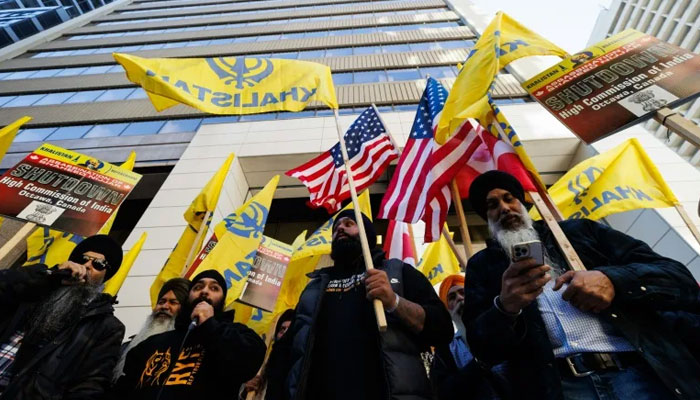‘Validation’ for Sikh activists after Canada slams Indian tactics
Khalistan campaign dates back to India’s 1947 independence and within India today any support for movement faces a swift crackdown
TORONTO: Ottawa’s accusations this week detailing a deadly Indian campaign against its Canada-based critics may have further derailed bilateral relations -- but to Sikh activists, the striking disclosures brought validation.
Canada has accused India of orchestrating the 2023 killing in Vancouver of 45-year-old naturalised Canadian citizen Hardeep Singh Nijjar, a prominent campaigner for “Khalistan,” the fringe separatist movement for an independent Sikh homeland in India’s Punjab state.
In public comments this week, Prime Minister Justin Trudeau and the national police said India’s targeting a prison cell around an effigy of the Indian leader.
Sohi said it was meaningful that Canada has now publicly affirmed the “danger” India poses to people living across Canada.
“It is shocking that we as Canadian citizens have to live in fear of a foreign government,” he said.
Testifying Wednesday at an inquiry on foreign interference, Trudeau made clear his government was not looking to blow up relations with a major trading partner with whom Canada has deep ties.
But he said when faced with clear evidence the Indian government had directed acts of violence inside Canada and breached Canadian “sovereignty,” he and the Royal Canadian Mounted Police resolved to go public in the interest of public safety.
The Khalistan campaign dates back to India’s 1947 independence and within India today any support for the movement faces a swift crackdown.
Jatinder Singh Grewal, a director with the Sikhs for Justice advocacy group and a Khalistan supporter, argued that Modi’s government is intent on silencing support for the movement abroad because it fears discussion among the Sikh diaspora could fuel a movement at home.
“If you allow the Canadian Sikhs, or the American Sikhs or the British Sikhs to openly talk about this, you will eventually make the Punjabi Sikh say, ‘Why can’t I talk about this openly?’”
Grewal praised Trudeau’s public disclosures and Canada’s decision to expel Indian diplomats but said more was needed, endorsing the closure of Indian consulates in Toronto and Vancouver, arguing they have been used to coordinate violence against Sikhs. There are roughly 770,000 Sikhs in Canada, about two percent of the population, the largest Sikh community outside of India. Sikhs are heavily concentrated in suburban areas, notably around Toronto and Vancouver, and the community’s vote has been pivotal in past national elections. Last year, days after Trudeau first accused Indian agents of killing Nijjar, one former government foreign policy advisor charged that domestic politics had influenced Trudeau’s decisions on Sikh affairs. Writing in The Globe and Mail, the former advisor Omer Aziz said Trudeau’s Liberal party was worried about losing votes to the left-wing New Democrats, led by Jagmeet Singh, who is Sikh.
-
 Mexico’s President Considers Legal Action Over Elon Musk Cartel Remark
Mexico’s President Considers Legal Action Over Elon Musk Cartel Remark -
 Prince William Hits The Roof With The Andrew Saga Bleeding Into Earthshot
Prince William Hits The Roof With The Andrew Saga Bleeding Into Earthshot -
 HBO Gives Major Update About 'Industry' Season Five And Show's End
HBO Gives Major Update About 'Industry' Season Five And Show's End -
 Donnie Wahlberg Responds To 'Boston Blue' Backlash: 'Nobody Was More Disappointed Than Me'
Donnie Wahlberg Responds To 'Boston Blue' Backlash: 'Nobody Was More Disappointed Than Me' -
 Jennifer Garner Gets Emotional Over Humble Career Start: 'It Makes Me Want To Cry'
Jennifer Garner Gets Emotional Over Humble Career Start: 'It Makes Me Want To Cry' -
 Princess Beatrice Told An Acquaintance That She ‘likes’ Jeffrey Epstein: Grim Verdict Drops
Princess Beatrice Told An Acquaintance That She ‘likes’ Jeffrey Epstein: Grim Verdict Drops -
 Late Katherine Short's Neighbours Give Insights Into Her 'peace Loving' Personality Post Suicide
Late Katherine Short's Neighbours Give Insights Into Her 'peace Loving' Personality Post Suicide -
 Fresh Details Of King Charles, Queen Camilla's US Visit Emerge Amid Andrew Investigation
Fresh Details Of King Charles, Queen Camilla's US Visit Emerge Amid Andrew Investigation -
 Iran 'set To Buy' Chinese Carrier-killer Missiles As US Forces Gather In Region
Iran 'set To Buy' Chinese Carrier-killer Missiles As US Forces Gather In Region -
 Prince Harry And Meghan Unlikely To Meet Royals In Jordan
Prince Harry And Meghan Unlikely To Meet Royals In Jordan -
 Hero Fiennes Tiffin Shares Life-changing Advice He Received From Henry Cavill
Hero Fiennes Tiffin Shares Life-changing Advice He Received From Henry Cavill -
 Savannah Guthrie's Fans Receive Disappointing News
Savannah Guthrie's Fans Receive Disappointing News -
 Prince William Steps Out For First Solo Outing After Andrew's Arrest
Prince William Steps Out For First Solo Outing After Andrew's Arrest -
 Jake Paul Chooses Silence As Van Damme Once Again Challenges Him To Fight
Jake Paul Chooses Silence As Van Damme Once Again Challenges Him To Fight -
 Google Disrupts Chinese-linked Hacking Groups Behind Global Cyber Attacks
Google Disrupts Chinese-linked Hacking Groups Behind Global Cyber Attacks -
 Four People Killed In Stabbing Rampage At Washington Home
Four People Killed In Stabbing Rampage At Washington Home




